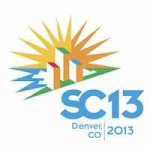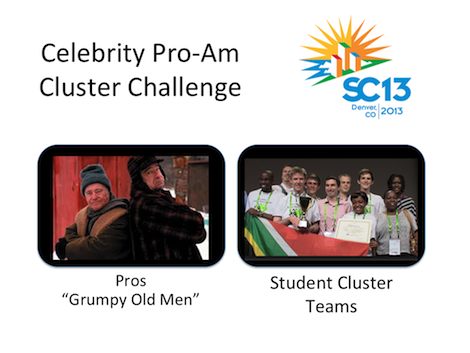 SC13 wrapped its 25th anniversary conference wrapped today with awards for the very best in supercomputing.
SC13 wrapped its 25th anniversary conference wrapped today with awards for the very best in supercomputing.
The conference drew 10,613 registered attendees who attended a technical program spanning six days and viewed the offerings of 335 exhibitors in the Colorado Convention Center.
The following awards were presented at the conference:
- The Best Paper Award went to “Enabling Highly-Scalable Remote Memory Access Programming with MPI-3 One Sided,” written by Robert Gerstenberger, University of Illinois at Urbana-Champaign, and Maciej Besta and Torsten Hoefler, both of ETH Zurich.
- The Best Student Paper Award was given to “Supercomputing with Commodity CPUs: Are Mobile SoCs Ready for HPC?” written by Nikola Rajovic of the Barcelona Supercomputing Center.
- The ACM Gordon Bell Prize for best performance of a high performance application went to “11 PFLOP/s Simulations of Cloud Cavitation Collapse,” by Diego Rossinelli, Babak Hejazialhosseini, Panagiotis Hadjidoukas and Petros Koumoutsakos, all of ETH Zurich, Costas Bekas and Alessandro Curioni of IBM Zurich Research Laboratory, and Steffen Schmidt and Nikolaus Adams of Technical University Munich.
- The Best Poster Award was presented to “Optimizations of a Spectral/Finite Difference Gyrokinetic Code for Improved Strong Scaling Toward Million Cores,” by Shinya Maeyama, Yasuhiro Idomura and Motoki Nakata of the Japan Atomic Energy Agency and Tomohiko Watanabe, Masanori Nunami and Akihiro Ishizawa of the National Institute for Fusion Science.
Other special awards given include:
- The inaugural SC Test of Time Award was presented to William Pugh from the University of Maryland for his seminal paper, “The Omega Test: a fast and practical integer programming algorithm for dependence analysis,” published in the proceedings of Supercomputing ’91.
- The 2013-2014 ACM Athena Lecturer, Katherine Yelick of Lawrence Berkeley National Laboratory and the University of California, was recognized during the conference keynote session and presented her lecture during the conference.
- The ACM Student Research Competition Award – Graduate
- Ehsan Totoni, University of Illinois at Urbana-Champaign (Gold Award)
- Nikhil Jain, University of Illinois at Urbana-Champaign (Silver Award)
- Dhairya Malhotra, University of Texas, Austin (Bronze Award)
- The ACM Student Research Competition Award – Undergraduate
- Carlo del Mundo, Virginia Tech (Gold Award)
- Stephen Herbein, University of Delaware (Silver Award)
- Robert Gerstenberger, Chemnitz University of Technology (Bronze Award)
- The George Michael Memorial Fellowship, awarded to exceptional PhD students, was presented to Jonathan Lifflander, University of Illinois at Urbana-Champaign; and Edgar Solomonik, University of California, Berkeley.
Finally, teams of students competed in the Student Cluster Challenge, a real-time, non-stop, 48-hour challenge in which teams of undergraduate and/or high school students assemble a small cluster on the SC13 exhibit floor and race to demonstrate the greatest sustained performance across a series of applications.
- The overall winning team in the Standard Track was the University of Texas, Austin, based on a combined score for workload completed, benchmark performance, conference attendance and interviews.
- The second Standard Track Student Cluster Challenge award went to the team from the National University of Defense Technology, China for the highest performance of the LINPACK benchmark for achieving 8.22 teraFLOPS.
- In the Student Cluster Commodity Track competition, teams were allowed to spend no more than $2,500 and the cluster must have a 15-amp power limit. The overall winning team of the Commodity Track was from Bentley University, Waltham, Massachusetts; and Northeastern University, Boston.
- The final Student Cluster award for the student team with the Lowest Dollars-per-gigaFLOPS level went to the team from Arizona State University, which achieved spent just $4.96 per gigaFLOPS.
Last, but not least, the old codgers were soundly defeated by the students in the first annual Celebrity Pro-Am Challenge.





